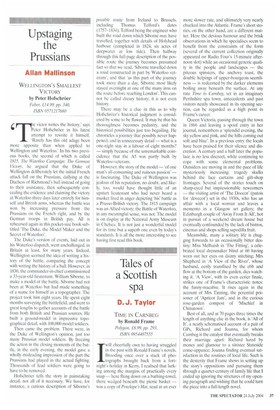Tales of a Scottish spa
D. J. Taylor
TIME IN CARNBEG by Ronald Frame Polygon, .f8.99, pp. 293, ISBN 0954407555 Twill cheerfully own to having struggled in the past with Ronald Frame's novels. Brooding once over a stack of photographs brought back from a fortnight's holiday in Kerry, I realised that lurking among the margins of practically every snap — here flung down on a bathing-towel, there wedged beneath the picnic basket — was a copy of Penelope's Hat, read at an ever
more slower rate, and ultimately very nearly chucked into the Atlantic. Frame's short stories, on the other hand, are a different matter. Here the devious humour and the brisk observations in which he specialises seem to benefit from the constraints of the form (several of the current collection originally appeared on Radio Four's 15-minute afternoon slot) while an occasional generic quality in the people and landscapes — the piteous spinsters, the anchovy toast, the double helpings of upper-bourgeois seemliness — is redeemed by the darker elements boiling away beneath the surface. At any rate Time in Cambeg, set in an imaginary Perthshire spa town, antecedents and past visitors neatly showcased in its opening section, can be regarded as a high point in Frame's career.
Queen Victoria, passing through the town in 1866 and leaving a spoof entry in her journal, remembers a 'splendid evening, the sky yellow and pink, and the hills coming out soft and blue'. In a previous entry the locals have been praised for their silence and discretion. A century and a half later the populace is no less discreet, while continuing to cope with some elemental problems. Outsiders are moving in and the pace of life mysteriously increasing: tragedy skulks behind the lace curtains and gift-shop frontages. Several of the stories touch on sharp-eyed but impressionable newcomers — the visiting artist of The Doocot' (patois for 'dovecot') set in the 1930s, who has an affair with a local woman and leaves a memento in a Glasgow art gallery; the Edinburgh couple of 'Away From It All', hot in pursuit of a weekend dream house but eventually confounded by the lack of bistros, cinemas and shops selling sapodilla fruit.
Meanwhile, many a solitary life is chugging forwards to an occasionally bitter destiny: Miss Melhuish in 'The Fitting', a celebrated local dressmaker blind at 60 having worn out her eyes on dainty stitching; Mrs Shepherd in 'A View of the River', whose husband, eerily transfixed by the ebb and flow at the bottom of the garden, dies watching it. 'A View', with its even eerier finale, strikes one of Frame's characteristic notes: the funny-macabre. It rises again in the account of Mrs Tinning, the potential poisoner of 'Apricot Jam', and in the curious rose-garden compost of 'Mischief in Chinatown'.
Best of all, and at 70 pages three times the length of anything else in the book, is 'All of It', a neatly schematised account of a pair of GPs, Richard and Joanna, for whom Carnbeg is the catalyst that eventually breaks their marriage apart: Richard lured by money and glamour to a sinister Stateside come-uppance; Joanna finding eventual satisfaction in the routines of local life. Such is the dexterity that Frame shows in setting up the story's oppositions and pursuing them through a quarter-century of family life that I ended up ignoring the strictures of my opening paragraph and wishing that he could turn the piece into a full-length novel.


























































 Previous page
Previous page